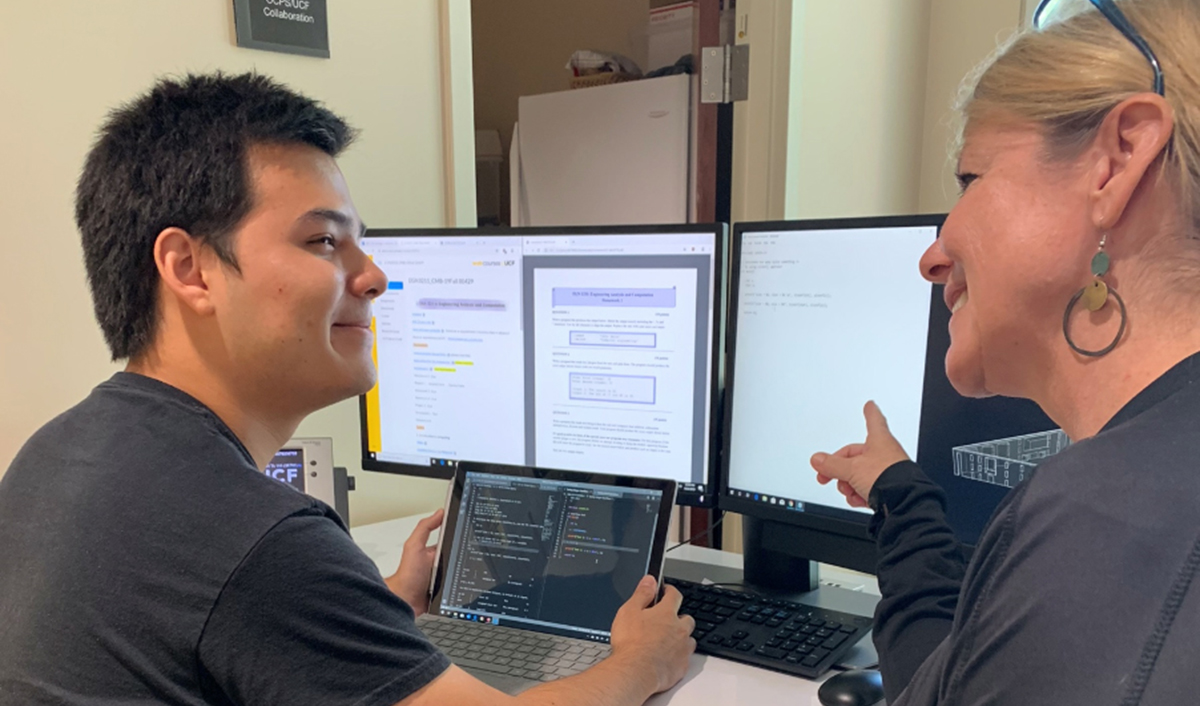
Do you struggle with the focus and dedication needed to get through a homework assignment without checking your phone every few minutes? When it comes to remote learning, do you have difficulty staying attentive while your professor presents through a computer screen?
If these things sound like you, then you might benefit from personalized coaching sessions at the Toni Jennings Exceptional Education Institute for students who need help with organization, planning, memory or other executive functions.
Matthew Marino, a professor of exceptional student education, explains that executive functions are “the process of physical, cognitive and emotional self-control and self-regulation necessary to maintain an effective goal-directed behavior.”
Basically, these brain functions manage your attention, emotions and pursuit of goals. This means that you have the ability to not only begin a particular task, but to also see it through to completion. When a professor assigns homework, you have the cognitive ability to sit down, do the work and then submit it in a timely fashion (i.e. before the deadline).
Students who have executive function dysfunction struggle with planning, organizing and persisting in complex academic tasks, such as completing homework assignments or creating and submitting projects on time. Executive function disorders have been correlated with other disabilities such as attention deficit/hyperactivity disorder (ADHD) and traumatic brain injury (TBI), says Marino.
Students who already have executive function issues may feel these areas of weakness being exasperated by the amount of discipline and motivation required when taking classes online or working from home during the COVID-19 pandemic.
Marino says that students who have executive function dysfunction may see these issues increase in STEM courses. “Many students struggle and fail to persist in their programs. They are easily distracted and often do not accomplish their goals in the timeline established by their professor because they do not plan or start the task in a deliberate manner,” says Marino.
Unfortunately, these areas of weakness can lead to depression, stress, lower self-esteem or dropping out of particular programs.
However, all hope isn’t lost. “Research indicates that executive function skills can be enhanced using coaching practices focused on metacognitive awareness (awareness of one’s own thinking), self-determination and student autonomy,” says Marino.
The program is student-centered, meaning based on the education and outcome of the assessments, the students will identify areas they choose to work on.
Kiera Anderson
The model for the FOCUS program (which stands for Focusing, Organizing and Coaching Undergraduate Students) is based on the results of a three-year National Science Foundation study. The research found that students receiving coaching “achieved higher levels of performance, as measured by GPA, and higher levels of persistence, as measured by lower changes in their major,” says Marino. “We expect this trend to continue.”
The students who struggled with executive functions and completed coaching sessions not only improved their grades and academic standing, but also found the autonomy and confidence to continue in their chosen field, even the STEM courses.
Students who participate in coaching sessions at the Toni Jennings Exceptional Education Institute will be working with trained doctoral students.
“The program is student-centered, meaning based on the education and outcome of the assessments, the students will identify areas they choose to work on,” says Kiera Anderson, a doctoral student in exceptional education who worked for roughly 20 years as an occupational therapy practitioner before coming back to school. “Through education, learners are empowered.”
Students who join the program will begin with a face-to-face session to complete an assessment. For example, students might complete a list sorting test in which they view pictures of animals in a random order, then list them in order from the smallest size to the largest. This particular test would be looking at the student’s working memory, explains Marino.
During the next 45-minute meeting, the coach will interview the student to learn about their daily routines, habits and hobbies. During the third visit, the coach and student will go over the gathered data, discuss the areas that the student wants to focus on and then begin creating a personalized plan of action.
“Students with executive function deficits struggle with persistence and often do not achieve their full potential,” says Anderson. The student-centered approach allows the students to gain confidence through self-discovery of the techniques that work or don’t work, allowing them to increase both their executive function skills and their autonomy, says Anderson. Two or three strategies will be introduced each week for the student and coach to implement and assess.
Some strategies that could be used are: establishing different routines, creating checklists and using timers or planners. “For example, one student may benefit from the use of a timer or app on a smart phone to assist with planning daily activities, whereas another student may benefit from paper and pencil lists to plan daily activities,” explains Anderson.
Undergraduate students who are interested in learning more or participating should contact the Toni Jennings Exceptional Education Institute by phone (407-823-6705) or email (tjeei@ucf.edu).